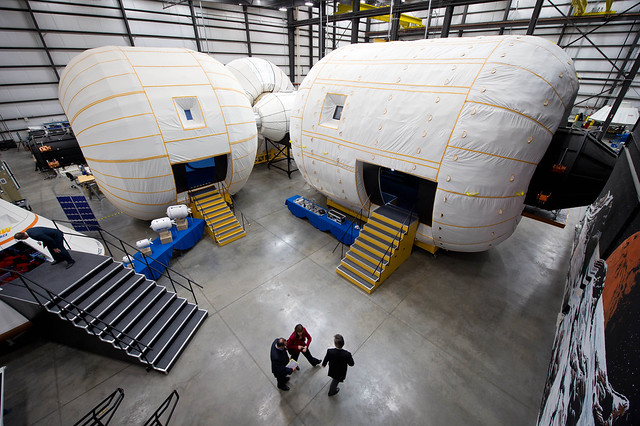
History
NASA's TransHab Design
Bigelow originally licensed the multi-layer, expandable space module technology from NASA after Congress canceled the ISS TransHab project following delays and budget constraints in the late 1990s. Bigelow has three Space Act agreements whereby Bigelow Aerospace is the sole commercializer of several of NASA's key expandable module technologies.
Bigelow continued to develop the technology for a decade, redesigning the module fabric layers—including adding proprietary extensions of Vectran shield fabric, "a double-strength variant of Kevlar" and developing a family of uncrewed and crewed expandable spacecraft in a variety of sizes. Bigelow invested US$75 million in proprietary extensions to the NASA technology by mid-2006 , and $180 million into the technology by 2010. In early 2010, NASA came full circle to once again investigate "making inflatable space-station modules to make roomier, lighter, cheaper-to-launch spacecraft" by announcing plans in its budget proposal released 22 February 2010. NASA is "considering connecting a Bigelow expandable craft to the ISS to verify their safety by testing life support, radiation shielding, thermal control and communications capabilities."
Since early on, Bigelow has been intent on "pursuing markets for a variety of users including biotech and pharmaceutical company and university research, entertainment applications and government military and civil users." The business model includes "'leasing out' small space stations or habitats made of one or more [BA-330] inflatable modules to different research communities or corporations.". Despite these broad plans for space commercialization, the space tourism destination and "space hotel" monikers were frequently used by many media outlets following the 2006/2007 launches of Genesis I and Genesis II. Robert Bigelow has been explicit that he is aiming to do business in space in a new way, with "low cost and rapid turnaround, contrary to traditional NASA ISS and space shuttle operations and bureaucracy."
In October 2010, Bigelow announced that it has agreements with six sovereign nations to utilize on-orbit facilities of the commercial space station: United Kingdom, Netherlands, Australia, Singapore, Japan and Sweden. In February 2011, the United Arab Emirate of Dubai became the seventh country to have signed on.
Module design and business plans
A full scale mockup of Bigelow Aerospace's Space Station Alpha inside their facility in Nevada.
NASA Deputy Administrator Lori Garver views the inside of a full scale mockup of Bigelow Aerospace's Space Station Alpha.
Bigelow Aerospace anticipates that its inflatable modules will be more durable than rigid modules. This is partially due to the company's use of several layers of vectran, a material twice as strong as kevlar, and also because, in theory, flexible walls should be able to sustain micrometeorite impacts better than rigid walls. In ground-based testing, micrometeoroids capable of puncturing standard ISS module materials penetrated only about half-way through the Bigelow skin. Operations director Mike Gold commented that Bigelow modules also wouldn't suffer from the same local shattering problems likely with metallic modules. This could provide as much as 24 hours to remedy punctures in comparison to the more serious results of standard ISS skin micrometeoroid damage.
Expected uses for Bigelow Aerospace's expandable modules include microgravity research and development and space manufacturing. Other potential uses include variable-gravity research—for gravity gradients above microgravity including moon (0.16 g) and Mars (0.38 g) gravity research; space tourism—such as modules for orbital hotels; and space transportation—such as components in spaceships for Moon or Mars manned missions.
On April 10, 2007, Bigelow Aerospace announced business plans to offer (by 2012) a four-week orbital stay for US$15 million, with another four weeks for an additional US$3 million. An entire orbital facility could also be leased for US$88 million a year, or half a facility for US$54 million a year. Speaking during a teleconference organised by the Commercial Spaceflight Federation in February 2010 Bigelow announced a new price of $23 million for a 30 day stay on a Bigelow habitat. That price covers everything including transport, training, and consumables.
In 2010, Bigelow proposed conceptual designs for expandable habitats that would be substantially larger than the BA-330, previously its largest at 330 m3 habitat volume. Contingent on NASA going forward with a super heavy lifter, the proposed concept would include "expandable habitats offering 2,100 cubic meters of volume nearly twice the capacity available on the International Space Station" and another providing 3,240 cubic meters.
In 2010, Bigelow Aerospace began building a large production facility in North Las Vegas, Nevada to produce the space modules. The 181,000 square feet (16,800 m2) facility will include three production lines for three distinct spacecraft, doubling the amount of floor space at Bigelow and transitioning the focus from a research and development, with an existing workforce of 115, to production. Bigelow expects to hire approximately 1200 new employees to staff the plant, with production commencing in early 2012.

NASA Deputy Administrator Tours Bigelow Aerospace (201102040004HQ)
NASA Deputy Administrator Lori Garver is given a tour of the Bigelow Aerospace facilities by the company's President Robert Bigelow on Friday, Feb. 4, 2011, in Las Vegas. NASA has been discussing potential partnership opportunities with Bigelow for its inflatable habitat technologies as part of NASA's goal to develop innovative technologies to ensure that the U.S. remains competitive in future space endeavors. Photo Credit: (NASA/Bill Ingalls)

















